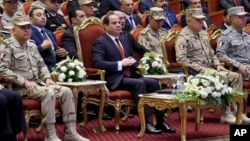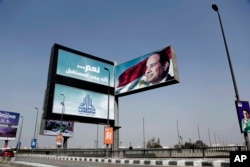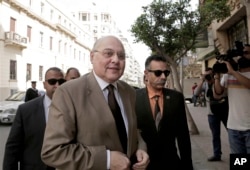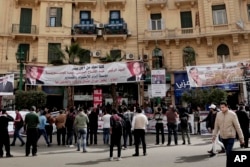Egyptians living abroad were in the middle of three days of voting Saturday in the country's presidential election.
Incumbent Abdel Fattah el-Sissi is expected to beat his only challenger, Moussa Mostafa Moussa, the head of al-Ghad party, who had previously endorsed el-Sissi's candidacy.
The election, set for March 26-28 within Egypt, has drawn attention from members of the U.S. Congress as well as Egyptian expatriates. This week, Democratic Representative Jim McGovern of Massachusetts said he and some colleagues already had begun drafting a resolution to address their concerns about what he said was a lack of fair and free elections in Egypt.
McGovern, the co-chairman of the Tom Lantos Human Rights Commission, said that while Egypt is a close U.S. strategic partner, there is a bipartisan concern in Congress over events leading up to the election.
Intimidation, detention
"Recent developments, including the intimidation and detention of all credible opposition candidates and restrictions imposed on nongovernmental groups and the media, are undermining the legitimacy and credibility of those elections," he said.
"We cannot and must not overlook actions and policies that reinforce authoritarian tendencies in Egypt and further weaken the rule of law," McGovern added.
El-Sissi was elected president in 2014, after he led a military coup that ousted the first elected civilian president, Mohamed Morsi.
Concerns over abuses
This week, a group of Egyptian-Americans of different political backgrounds went to the U.S. Capitol to discuss problems they see regarding the election.
Among them was Aya Hijazi, an Egyptian-American social advocate who was imprisoned in Egypt under false charges of child abuse. She was held for nearly three years before U.S. President Donald Trump negotiated her release during el-Sissi's visit to Washington last year.
Hijazi said Egyptian-Americans have a moral obligation to stand with fellow Egyptians and tell Congress and the administration about the government's efforts to suffocate political space in Egypt.
"I think President Trump thinks that [el-]Sissi makes Egypt more secure. I know that the president was really sympathetic personally to my case, but there are thousands like me who are in the same situation but no one is speaking for them," Hijazi said.
Although an eligible voter, Hijazi will not cast her ballot at the Egyptian Embassy in Washington. She said that, from her personal experience, she knows that el-Sissi is leading a brutal crackdown on civil society.
Sahar Aziz, a professor of law at Rutgers University in New Jersey, is also boycotting the Egyptian election.
"I would feel compelled not to participate in these elections, because it would legitimate a process that has unprecedentedly not given anyone a fair opportunity to run for office," Aziz said.
Protection for minority Copts
However, Michael Morgan, a doctor who also anchors a weekly television show on Egyptian issues, said he was inclined to vote for el-Sissi as a protector of the country's Christian minority.
"As a Coptic Christian, I think we finally have a president that wants to make the Christians feel that they are part of the country, treated as Egyptians," Morgan said. Christians have been targeted in several terrorist attacks in Egypt over the past few years.
Morgan acknowledged there are problems regarding human rights but said the el-Sissi government faces many challenges, including security threats from militant groups and a weak economy.
But Mokhtar Kamel, co-founder of a group called the Egyptian American Alliance, said that did not justify forcing credible candidates out of the presidential race.
"I will not be voting, because I do not think there is a voting. There is a process and I am not taking it seriously; nobody is taking it seriously," Kamel said.
Human rights activists and political analysts say el-Sissi's government has pressured some would-be candidates to drop out of the race, and others have been arrested and jailed.
Kamel and some other Egyptian-Americans say voters have no real choice since el-Sissi's only rival, Moussa, previously had campaigned for a second term for the incumbent.
Term limit question
Kamel and other voters say they fear the next step after this election will be a vote in the Egyptian parliament to remove the constitutional term limit, allowing el-Sissi to become president for life.
Earlier this month, 10 influential members of the U.S. Senate sent a letter to the State Department asking for an assessment of human rights in Egypt, including the freedoms of association, peaceful assembly and expression.
The senators expressed their concern about the restrictive environment for the media, which they said would make it impossible for the Egyptian people to participate in a legitimate democratic exercise.







